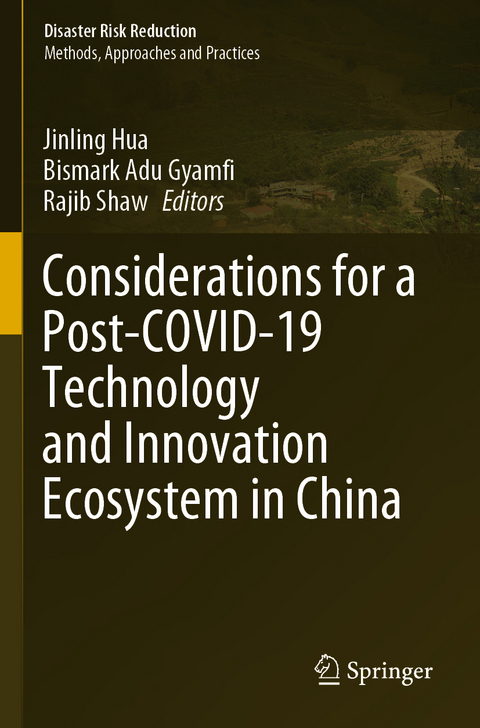
Considerations for a Post-COVID-19 Technology and Innovation Ecosystem in China
Springer Verlag, Singapore
978-981-16-6961-3 (ISBN)
Jinling Hua is a lecturer at the Faculty of Policy Management of Keio University, Japan. She is engaged in information and communication technology and policy research. In particular, she has published many papers on the spread of information technology in China and Japan, including China's mobile phone and mobile terminal brand manufacturers, China Telecom infrastructure construction, the regional and usage characteristics of the mobile phone and PHS communication services in China, the use of information media in the governance of COVID-19 in China and the infodemic phenomenon, the application and technological innovation of 5G, artificial intelligence, big data, and robots and other advanced technologies in the governance of COVID-19. Since 2020, she has been a representative of the project to develop a sustainable digital society and media in China. She has a doctorate in policy media from Keio University in Japan. Bismark Adu Gyamfi is currently pursuing a Ph.D. in the Graduate School of Media and Governance in Keio University, Japan. His research interests include resilience ecology, land use and urban planning, and smart cities and mobilities. He completed a master’s degree in media and governance at Keio University and has a background in urban planning. He has been involved in a number of projects assisted by the Japan International Cooperation Agency (JICA) in urban and land-use planning, mostly in Africa and Southeast Asia. Rajib Shaw is a professor in the Graduate School of Media and Governance in Keio University, Japan. He is also a senior fellow of the Institute of Global Environmental Strategies (IGES) Japan, and the chairperson of the Sustainable Environment and Ecological Development Society (SEEDS) Asia and the Church World Service (CWS) Japan, two Japanese NGOs. He is a co-founder of a Delhi (India)-based social entrepreneur startup, the Resilience Innovation Knowledge Academy (RIKA). Earlier, he was the executive director of the Integrated Research on Disaster Risk (IRDR) and was a professor in Kyoto University. His expertise includes disaster governance, community-based disaster risk management, climate change adaptation, urban risk management, and disaster and environmental education. Professor Shaw was the chair of the United Nations Science Technology Advisory Group (STAG) for disaster risk reduction and currently is the co-chair of the Asia Pacific Science Technology Advisory Group (AP-STAG). He is also the coordinating lead author (CLA) for the Asia chapter’s 6th Assessment Report of the Intergovernmental Panel on Climate Change (IPCC). He is the editor-in-chief of the journal Progress in Disaster Science and series editor of a Springer book series on disaster risk reduction. Professor Shaw has published 53 books and over 400 academic papers and book chapters.
Overview of Post COVID Scenario in China.- Innovation and Technology Ecosystem: Historical Perspectives.- Drones Activity in Epidemic Prevention and Prospects in the Post COVID-19.- Social Media Development and Application During Pandemic and Post-Pandemic from the Perspectives of Recovery and Preparedness.- Towards a Digital China Through Digital Economy.- Big Data and Its Implication in China.- Robotics and Its Advancement in Modern China.- Artificial Intelligence and its Importance in Post COVID-19 China.- 5G and Its Implication to Communication in China.- Evolution from IoT to IoE Era in China.- Going Beyond the “Norm” in Technology and Innovation Apparatus in Emergency Situation: A Post COVID-19 Society.
| Erscheinungsdatum | 14.12.2022 |
|---|---|
| Reihe/Serie | Disaster Risk Reduction |
| Zusatzinfo | 30 Illustrations, color; 50 Illustrations, black and white; XII, 179 p. 80 illus., 30 illus. in color. |
| Verlagsort | Singapore |
| Sprache | englisch |
| Maße | 155 x 235 mm |
| Themenwelt | Studium ► Querschnittsbereiche ► Epidemiologie / Med. Biometrie |
| Naturwissenschaften ► Biologie ► Ökologie / Naturschutz | |
| Naturwissenschaften ► Geowissenschaften ► Geologie | |
| Schlagworte | Disruptive Technologies • Innovation Ecosystem • post-covid-19 • Risk reduction and resilience building • Science and technology in China |
| ISBN-10 | 981-16-6961-9 / 9811669619 |
| ISBN-13 | 978-981-16-6961-3 / 9789811669613 |
| Zustand | Neuware |
| Haben Sie eine Frage zum Produkt? |
aus dem Bereich


